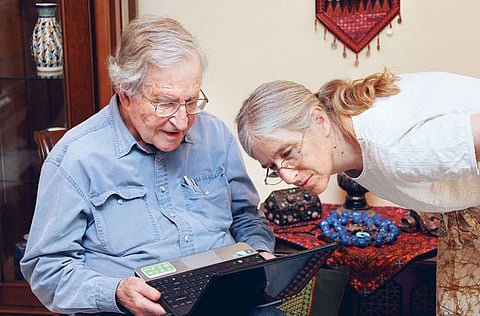Understated stature
Noam Chomsky comes across as a man without airs and an eager listener

I first came across the name Noam Chomsky as the author of a linguistics textbook when I was studying literature at the Beirut Arab University. Back then, I did not imagine in my wildest dreams that four years later I would not only meet Chomsky in person, but even better, accompany him on a tour that would take us to the Lebanese-Israeli border. Chomsky, a far-Left Jewish-American political commentator and one of the most influential and controversial intellectuals of our time, was in Lebanon to deliver a lecture on "America's foreign policy in the Middle East".
As a reporter in Dubai, I had very little time to prepare for the trip. I grabbed my laptop, a video camera and my carry-on luggage and before I knew it, I was on a plane headed to Beirut. Though my flight departed after midnight, I was too excited to fall asleep. All I could think of was: What am I going to ask him? About linguistics? Palestine? Or his life?
Our meeting point was the Le Commodore Hotel, located on the busy Hamra Street in the heart of Beirut. The hotel was famous in the 1970s and 1980s for being a harbour for journalists who were covering Lebanon's many wars. That is where Chomsky was staying with his daughter Aviva and two of his friends. I was quite nervous about meeting him. I saw him in the lobby and rushed to introduce myself. He welcomed me with a smile and a nod.
At 7.30am we set out on our trip to Tyre, a coastal city in the south of Lebanon. We had two stops in Tyre. First, a meeting for Chomsky with an official from Hezbollah, which was excessively played up in the media the next day, and second, a local hat store because Chomsky needed a hat for his day-long trip. "How does it look?" he asked me as he walked out of the store. My tongue was tied by the unexpected question. Was he talking to me? I thought the military hat looked great on him.
Bond of language
I thought twice before striking up a conversation in Hebrew with him. My Hebrew is rusty but I decided to go for it. "My name is Samia and I'm from Lebanon," I said in Hebrew. Chomsky raised his eyebrows in surprise at the completion of my sentence. He responded — in Hebrew. He told me his Hebrew was rusty as he had not used it in 55 years.
We then started talking in English and Hebrew. He asked me about school, where I learnt Hebrew, where I worked and how I liked living in Dubai. I told him I liked it but have found it very different from where I had lived before — Lebanon and the United States.
By that point the trip had by far exceeded my own expectations. The image I had of Chomsky had changed. I wasn't just a reporter and he wasn't just a great linguist and philosopher. We were two people sharing the same ride to the southern Lebanese border and talking about our lives.
"Did you know you wanted to do what you're doing now when you were a child?" I asked him. "I did what seemed natural at the time," he told me. Then he mentioned a story which I had read about him in the past. He wrote his first article in the fourth grade. "It was for the fourth grade newspaper of which I was the editor and probably the only reader," he said laughing.
I asked him about being denied entry by Israel to the West Bank. I wanted to hear the story from him. "What they didn't like was I was going to talk at Birzeit but I wasn't going to an Israeli university," he told me. When I asked him if he would try to go again, he said he would but through Amman rather than through Ben Gurion Airport, on point of principle. "They're acting very irrationally. If I had just gone in, I would have given a talk at Birzeit and no one would have heard about it," he added. "They're stupid. They're doing a lot of stupid things."
The trip, which I caught on tape, included stops in the southern villages of Bint Jbeil, Maroun Al Ras, Khiam Prison, Nabatiyeh and Mleeta. They are places that were heavily hit in the 2006 war on Lebanon.
At every stop we made, I rolled my camera for a video I was making on Chomsky. At one point our driver, a young Lebanese guy, came up to me and said: "So who is this man?" He was completely clueless. "Noam Chomsky. Haven't you heard of him?" I told him. "No, never heard of him," he responded. But it wasn't just the driver though. Many villagers who saw us looked our way and then went about their business. Chomsky smiled. Sometimes he waved at the people who stood looking from a distance. They waved back.
An ear for information
Throughout the trip, Chomsky asked questions. He was curious to know about the reconstruction process, living conditions of the villagers, water supply and Unifil peacekeeping forces. At 81, he was a very good listener. "It's amazing to be here — a place I have read so much about," his daughter Aviva told me as we walked throughout the village. That is when I knew that Aviva and her father cared about the south just as much as did a Lebanese southerner like myself.
Sign up for the Daily Briefing
Get the latest news and updates straight to your inbox



